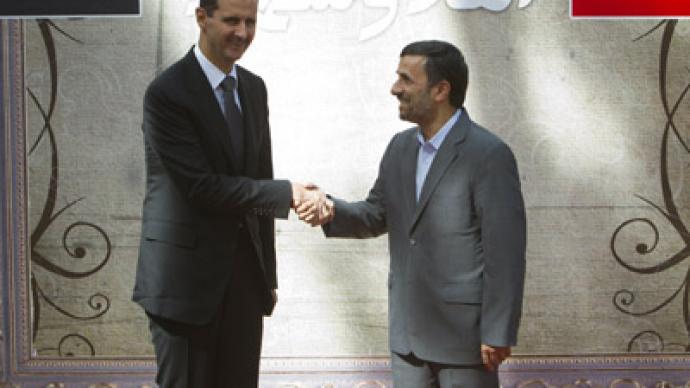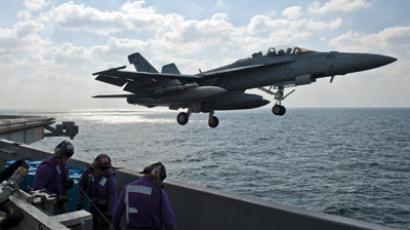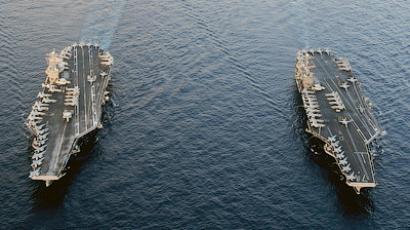Iran preparing a soft landing strip for Syria

Iranian politicians are watching events in Syria with concern: their view is that the country is being attacked by Saudi Arabia and Israel for its ties with Iran and its support for Palestinians, rather than part of the Arab Spring.
Mohammad Naderi of Iran’s National Security Council believes that “if Syria falls it will be the time to strike on Iran.”“The United States proceeds from the fact that in the modern world, nobody has the right to resist the global order. Today, Iran is the only country which has the anti-American position, and which politically resists the U.S.’s global hegemony,” says Naderi.In his view, pressuring Syria is part of the U.S. strategy. “This is why all kinds of forces are working for this strategy. Such groups as Salafis, Wahhabis, and separatist movements, and Saudi Arabia are involved in this Syrian issue." Ali Akbar Javanfekr, chief executive of the official Islamic Republic News Agency (IRNA) and presidential advisor, believes that Assad’s readiness for reforms and Russia’s assistance help reduce this pressure on Syria.“Amid these tough conditions, the Syrian government managed to achieve a certain success against the opposition that had been armed by the US and Israel. The reforms that they are performing are bearing fruit already. We believe that Russia’s position on the Syrian issue is a commendable one". Dr Seyed Abbas Araghchi, Deputy Foreign Minister of Iran, former Iran’s ambassador to Finland and Japan, says that Syria is being pressured not only for resisting Israel and supporting Palestinians, but also because of the new movements in the country.“In the wake of the Arab Spring, new democratic movements were established in various places including Syria. These forces support the real democratic changes. They have their principles and a certain self-identification," says Araghchi. He is convinced that sooner or later, these forces will spread throughout the entire East, including Saudi Arabia, the states of the Gulf, and Qatar. But the United States has been restraining their appearance in those countries where it doesn’t want it, and intensifying them in other countries where it wants to see the regime change.There’s a popular opinion in Iran that the wave of the Arab Spring, or the Islamic Awakening, is a natural continuation of the Islamic revolution, rather than a result of the American plan for changing the world.“Iran was the first country to see these changes. In 33 years, the impulse of the Iranian revolution against the dictatorship and corruptive regime reached the Islamic world. In Iran, the democratic values and the Islamic concept are combined. In the Middle East today, there isn’t an issue which could be resolved without Iran. This is a result of Iran’s strong resistance in the face of the US," insists Araghchi.The Iranian regime considers the situation with Syria as a special case though.“The countries need reforms and those should be carried out by the countries themselves, not imposed from outside. In Syria, such changes were attempted artificially because Syria opposed Israel. Syria does need reforms but only those that would be carried out naturally, not through groups created behind the curtains with absolutely different agendas,” Aragchi said.He is aware of the opinion that Syria was subjected to pressure because it is Russia’s main base in the Middle East. Iran has a different view, however.“Syria is Iran’s long-time ally. If it is destroyed, its enemies will have hit three targets by one shot: the Palestinian movement, Iran and Syria itself. The situation with Syria differs from the one with Libya because a military action in this case would involve Iraq, Jordan and Turkey. The whole region will be destabilized,” said Aragchi.Hossein Shariatmadari, Iran’s Supreme Leader’s representative, president of Kayhan group of Newspapers, is even more categorical:“Assad’s role is important as he is a key and symbolic figure. Everything possible should be done to preserve him. We insisted on carrying out reforms before the Islamic awakening.”Shariatmadari believes that the uprising in Syria is different from what was going on in other Muslim countries.“The events of the Islamic awakening that have been going on in the region have several aspects. Firstly, it’s events with Islamic demands – in Mosques and during prayers. Secondly, the events concern the public at large. Thirdly, the events are anti-globalist in character. There is none of the above in Syria – Muslims have not uprisen there. I don’t want to say the Syrian opposition consists of non-Muslims, but they are in a tiny minority there. The opposition in Syria is not an anti-colonial movement – it’s backed by Saudi Arabia and Israel exactly with a purpose to remove Syria from the resistance against colonialism.”
Nadezhda Kevorkova, RTThe statements, views and opinions expressed in this column are solely those of the author and do not necessarily represent those of RT.















